Oct 2020 1st edition
Oct 2020 1st edition Londekile
Translations
Jobs: Government Communications (GCIS)
Jobs: Government Communications (GCIS) LondekileDirector: Media Production
Chief Directorate: Communication Service Agency
Salary: An all-inclusive package of R1 057 326 per annum
Reference number: 3/1/5/1 – 20/75
Enquiries: Ms N Shuping, Tel: 012 473 0042
Director: Vuk’uzenzele
Chief Directorate: Products and Platforms
Salary: An all-inclusive package of R1 057 326 per annum
Reference number: 3/1/5/1 – 20/76
Enquiries: Mr T Seale, Tel: 012 473 0324
Centre: Pretoria
Closing date: Friday, 9 October 2020
Applications: The Director-General, Government Communication and Information System, Private Bag X745, Pretoria 0001, or hand deliver to Tshedimosetso House, 1035 corner Frances Baard and Festival streets, Hatfield, Pretoria.
For attention: Mr S Ndlovu
Kindly visit www.gcis.gov.za for more information on the requirements and functions/key performance areas of these positions.
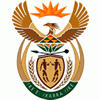
All you need to know about Alert Level 1
All you need to know about Alert Level 1 SiboneloMany regulations gazetted during the national state of disaster have changed now that South Africa has moved to Coronavirus Alert Level 1.
Despite changes to the regulations, all health protocols, such as wearing masks, social distancing and washing or sanitising hands remain in place.
Dr Nkosazana Dlamini-Zuma, the Minister of Cooperative Governance and Traditional Affairs, recently provided details of the regulations that have changed.
What is allowed?
- Curfew is from midnight to 4am.
- Alcohol sales at retail outlets: Monday to Friday from 9am to 5pm.
- Alcohol is permitted for on-site consumption at licensed establishments only and with strict adherence to curfew.
- Travel into and out of South Africa is allowed from 1 October, subject to certain restrictions.
- South African missions abroad will open for visa applications and all long-term visas will be reinstated.
- Social, religious, political and other gatherings are allowed. The number of people must not be more than 50 percent of the venue’s capacity. Also, only 250 people are allowed at indoor gatherings and 500 at outdoor gatherings.
- The number of people attending funerals has increased from 50 to 100, but not more than 50 percent of the venue’s capacity.
- Hotels, lodges, bed and breakfasts, timeshare facilities, resorts and guest houses: Not more than 50 percent capacity.
- Bars, taverns, shebeens: Not more than 50 percent capacity.
- Retail stores: Not more than 50 percent capacity.
- Casinos: Not more than 50 percent capacity.
- Exercise, recreation and entertainment venues: Not more than 50 percent capacity.
What is not allowed?
- Night vigils are not allowed.
- Nightclubs remain closed.
- No spectators at sports events.
- No international sports events.
- Male and female initiation practices are not allowed.
- A person may not be evicted from his or her land or home or have his or her place of residence demolished for the duration of the national state of disaster, unless a competent court has granted an order authorising the eviction or demolition.
- All visits by members of the public to correctional centres; remand detention facilities; police holding cells; military detention facilities; health establishments and facilities, except to receive treatment or medication; and older persons' residential facilities are prohibited. The Independent Electoral Commission can visit these centres for voter registration or special voting.
Be aware of scammers
Be aware of scammers LondekileWith many more people becoming desperate for an income as a result of losing their job or earning less money due to the effects of the Coronavirus disease (COVID-19), scam artists are trying even harder to take advantage of them.
“COVID-19 has unfortunately paved the way for hackers and fraudsters to prey on vulnerable South Africans even more,” says Carla Oberholzer, DebtSafe Debt Adviser and Public Relations Officer.
“We are urging people to take even more care when considering taking out a loan, applying for any form of credit or sharing their personal information with others,” she adds.
The fraudsters lie about their company and say that they are offering ‘legal credit proposals’, such as loans. “A typical advertisement from them usually includes certain conditions and upfront payments or fees. Consumers should not be caught off guard, as this is illegal and a criminal offense according to the National Credit Act,” says Oberholzer.
What to look for
Oberholzer says there are various things fraudsters say to people when they are trying to scam them, such as ‘cost-effective loan, in a short time frame’; ‘five percent fixed interest rate’; ‘no credit review’, ‘from R20 000 to R10 million’ or ‘COVID-19 Financial Relief Programme’.
“People must question these messages. Remember, when a credit deal sounds too good to be true, it usually is,” says Oberholzer.
She explains that a registered creditor is not allowed to ask for an upfront fee, sometimes referred to in adverts as an initiation fee or admin fee.
“These types of fees should form part of the monthly payment of the loan, for example. Look out for these words in the advert, message and terms and conditions and rather give this type of ‘real deal’ a skip.
“Do your research well, confirm a company’s credentials and make sure the company is registered with the NCR,” says Oberholzer.
Are you a scam victim?
If you are a victim of a loan or credit scam, notify your bank’s fraud division, registered credit bureaus, the Southern African Fraud Prevention Service and the National Credit Regulator’s complaints department.
In some cases, you may need to go to your nearest police station to get an affidavit and report the fraud.
Contact the NCR by sending an email to complaints@ncr.org.za or call 011 554 2600.
COVID-19 children’s book launched
COVID-19 children’s book launched LondekileTwo young women who are passionate about children and education have written a children’s book about the Coronavirus (COVID-19), featuring President Cyril Ramaphosa as one of the characters.
The Department of Sport, Arts and Culture (DSAC) recently launched the book, titled Cory in the Universe, co-written by former Miss South Africa and Honours in Curriculum graduate Ntandoyenkosi Kunene and PhD candidate and lecturer Thokozane Dyosini.
The writers, both qualified educators, want to help children between the ages of nine and 15 to gain a better understanding of COVID-19, which has caused a lot of uncertainty and panic.
“While it’s challenging for adults to sift through information to stay informed, it’s even more difficult for children who have mixed feelings and are trying to understand what the world is facing,” says Kunene.
“We saw a huge gap in the conversation around COVID-19. It was so adult-centred and no-one was focussing on how it was affecting children. They have lived through the pandemic, just like we have, and their lives have also changed. This was our inspiration to write the book,” she adds.
“The book is inclusive and diverse. We have characters from all walks of life as we wanted to portray the truly South African child in all of their forms,” says Dyosini.
The pair, who have always wanted to write children’s books, met in varsity. “We want our children to grow up seeing a different picture,” says Kunene. “We want Cory in the Universe to be the first of many books that speak to children about social challenges,” adds Dyosini.
Kunene and Dyosini partnered with the DSAC to make reading and entertainment a reality in South Africa.
“The book not only speaks to the heart of the children, but also many social issues that plague society,” says Minister of Sport, Arts and Culture Nathi Mthethwa, who penned the book’s foreword.
Celebrating our elders
Celebrating our elders UrsulaInternational Day for Older Persons, held annually on 1 October during Social Development Month, celebrates our elders and their importance in our communities. 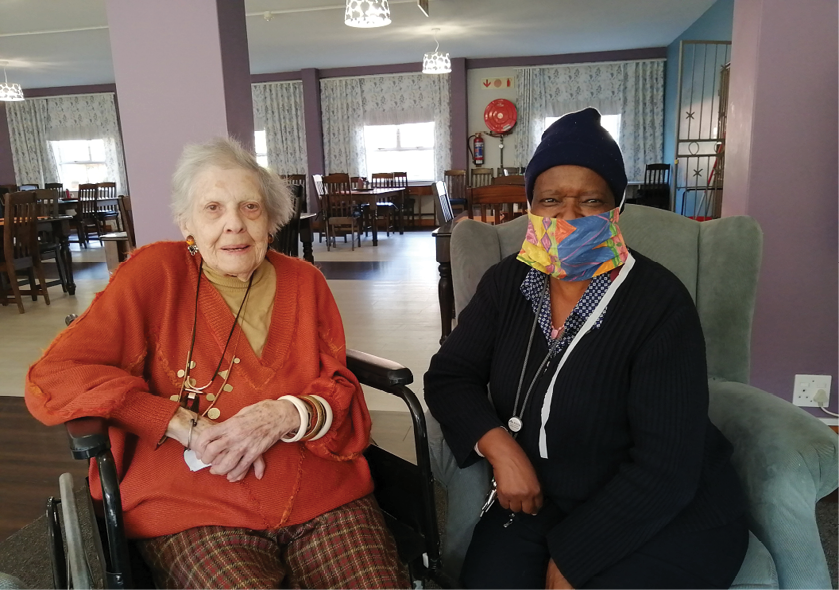
According to Statistics South Africa’s July 2020 mid-year population estimates report, 5.43 million people in South Africa are over the age of 60. The country’s elderly growth rate rose from 1.1 percent (2002 to 2003) to three percent (2019 to 2020).
With a growing elderly population, their needs must take centre stage, including social assistance programmes and easy access to food programmes and healthcare. Minister of Social Development Lindiwe Zulu recently highlighted this when she condemned violent crimes against senior citizens and called the public to care for and protect them.
Caring for the elderly
Nursing Services Manager Paulina Namo (62) has been caring for the elderly at Thembalami Care Centre, in Lombardy East, for 35 years.
“I love my residents. My granny was my mentor. I learnt a lot from her and appreciate the upbringing, life values and the wisdom of older people,” she says.
Namo, who holds a Primary Health Care Diploma from the University of the Witwatersrand, says the biggest lesson she has learnt from her work is the need to listen.
“Our elders need to be acknowledged for the contributions they have made to society and our economy. They are valued members of our community and we need to make sure that they know this,” she says.
Namo’s advice to younger generations is to respect their elders. “Give them a platform and let them be heard. If you no longer have a grandparent, adopt one in your community. This doesn’t have to be a financial commitment. You can spend time with and talk to them or help them get to the shops or church. Make them feel worthwhile and important.”
It’s also important to:
- Leave their furniture where it is. Moving things can cause confusion.
- Cook what they love to eat.
- Keep them active in the community.
- Spend more time with and learn from them.
- Always respect their choices. African grannies, for example, don’t like to go out without anything on their head or a shawl around their shoulders, as they see this is a sign of respect.
Stop elder abuse
Many people abuse the elderly, sometimes without knowing it.
“Sadly, some elders are bribed for their pension. This is cruel and sad. Even though they have little, they want to contribute to society. When this happens, they don’t have a voice and can become withdrawn,” says Namo.
She adds that looking after young children all day can be tiring, especially if the grandparent has health problems.
Apply for an Older Person’s Grant
The South African Social Security Agency (SASSA) pays a monthly Older Person’s Grant to over three million people.
Elders who meet certain criteria, including being 60 and older and not receiving any other social grant, can apply.
For more information about how to apply, visit SASSA’s website at www.sassa.gov.za and click on social grants.
Community avoids Day Zero thanks to boreholes
Community avoids Day Zero thanks to boreholes LondekileWork is underway to prevent areas of the Eastern Cape and KwaZulu-Natal from experiencing a major water crises.
Drought relief efforts have ensured that residents of the upper Wavecrest suburb in Jeffreys Bay continue to have water, despite the ongoing drought.
 Ward councillor Ludwig Vorster says his ward’s 7 800 residents have not felt the impact of the drought as the Department of Water and Sanitation (DWS) fixed the local water purification plant, replaced old pipes and dug boreholes which supply fresh water to the community.
Ward councillor Ludwig Vorster says his ward’s 7 800 residents have not felt the impact of the drought as the Department of Water and Sanitation (DWS) fixed the local water purification plant, replaced old pipes and dug boreholes which supply fresh water to the community.
Vorster says the drought relief programme implemented in all the wards of the Kouga Local Municipality has helped them avoid Day Zero, which has been declared in the neighbouring Nelson Mandela Bay Metro Municipality. Day Zero is when a town’s water supply is critically low and taps may run dry.
“Our area has avoided Day Zero thanks to the drilling of boreholes, the replacement of old pipes and the upgrading of the local water treatment plant. The department also built a new tank to ensure that high-lying areas of Jeffreys Bay have enough water pressure in the taps,” Vorster says.
The DWS spent R58 million in finding alternative water sources, such as groundwater, in Oyster Bay, St Francis Bay, Jeffreys Bay, Humansdorp, Patensie and Hankey. Vorster says that R32 million was spent on his ward alone.
Through the Water Service Infrastructure Grant, the department has spent R92 million on drought relief programmes in the Kouga Local Municipality.
DWS spokesperson Sputnik Ratau says: “Some of the work that has been done as part of the funding, includes the replacement of leaking pipelines in Patensie, Oyster Bay and Hankey; internal leak audits; repairs of leaks; water meter repairs; reticulation pipe replacement and reservoir level control.”
Meanwhile, the department says that the Greytown Bulk Water Supply project, which is set to provide emergency water relief and long-term water supply to Greytown and Enhlalakahle in the KwaZulu-Natal Midlands, has completed its first phase, which is set to restore the water treatment works to an estimated peak capacity of six million litres.
DWS is working with the uMzinyathi District Municipality to implement phase two of the project.
Entrepreneur evolves with the digital era
Entrepreneur evolves with the digital era UrsulaAn internet service provider is growing his business by providing his clients with custom-made connectivity solutions. 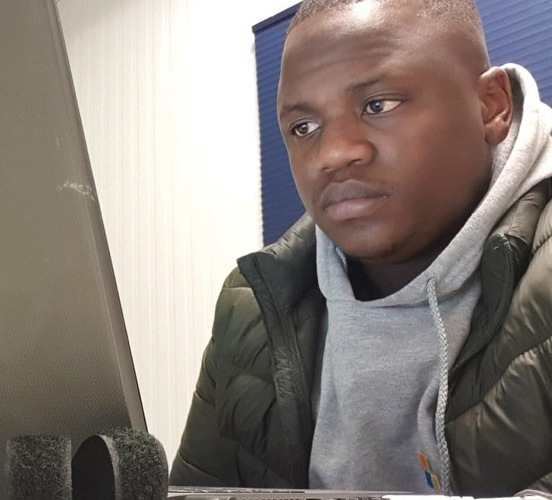
The owner of East London-based EC Internet, Luvo Grey (27), says he uses data analysing software such as Tableau to better understand the needs of his clients.
Grey says: “The information we collect and read helps us to understand the connectivity needs of our customers. As a business that provides connectivity services like fibre and Wi-Fi hotspots, we need to know what packages are best for the communities we serve.
“It is pointless to sell uncapped Wi-Fi at a huge cost when the user will use it for basic social networking sites. We need to provide that client with a cheaper alternative for their needs.”
Started in 2018, EC Internet provides physical telecommunications infrastructure such as fibre and satellites that transmit radio waves. In September 2019, the company was given an Independent Communications Authority of South Africa licence to provide internet access for businesses, households and public institutions.
“We cater for all members of the community. We are working on a move that will provide Wi-Fi hotspots to streets in townships. This can be done as we have already created this working with the East London Industrial Development Zone (ELIDZ). We created a hotspot for one of the townships neighbouring the ELIDZ.”
Having learnt how to code from a one-year data science course conducted by the Department of Communications and Digital Technologies and the Media, Information and Communication Technologies Sector Education and Training Authority, Grey says that he is now able to build software that will help improve his business’ product offering.
Minister of Communication and Digital Technologies Stella Ndabeni-Abrahams spoke at the data science course graduation ceremony in September, saying that data science is the career of the future.
“Data scientists are one of the most demanded professionals in this digital era. This is due to the vast applicability of data science skills. Data science is being applied in fields such as medicine, finance, logistics, aviation, automobile, manufacturing and many other industries,” she says.
If you are interested in the data science programme visit the MICSETA website on www.mict.org.za or call 011 207 2600.
GBV victim’s life saved by NGO
GBV victim’s life saved by NGO SiboneloA victim of long-term gender-based violence (GBV) – who was beaten, threatened with murder and shot – says if it were not for Masimanyane Women’s Rights International, she would be dead. 
Lindelwa Ntanta (59), an East London resident, went through 18 years of abuse at the hands of her ex-husband, who she finally managed to divorce in 2018.
She says his abuse led to one of her three children committing suicide. It started with psychological and verbal abuse but quickly escalated to physical assault.
She says: “I got a protection order against him and he was told not to come to my house. Within a few days, he broke the order and I had him arrested. After he was released, he came back with a gun and shot me in the legs, saying that he was going to kill me.”
Over the years, despite not living with them anymore, he continued to harass the family, often targeting the spaza shop Ntanta ran by destroying her stock.
Ntanta says Masimanyane Women’s Rights International, an NGO funded by the Department of Social Development, has provided tremendous support over the years. The Masimanyane team helped Ntanta obtain several protection orders over the years, assisted her with counselling and in getting her granddaughter’s school fees reduced.
“I am alive because they have protected me from my abuser. Even now, they are assisting me with legal matters as my ex-husband is trying to sell the house we live in,” says Ntanta.
Masimanyane is an anti-GBV organisation that has been in existence since 1996. It has offices in Mdantsane and East London Magistrate’s Courts, as well as staff based at the Fleet Street, Buffalo Flats and Duncan Village police stations.
Community project manager for Masimanyane, Buyiswa Mhambi, says the organisation offers support services to victims of abuse, including counselling, shelter, abuse awareness and computer and craft skills.
“The reason we have offices at police stations is so that we can help GBV victims the moment they go to report a case,” says Mhambi.
Visit Masimanyane Women’s Rights International’s office in Scenery Park township or go to their website: www.masimanyane.org.za
Gogo’s joy as she becomes a home-owner
Gogo’s joy as she becomes a home-owner LondekileAfter living in Kanana informal settlement in Gugulethu in the Western Cape for 27 years, Xoliswa Patso (62) has finally moved into a decent home with her family. 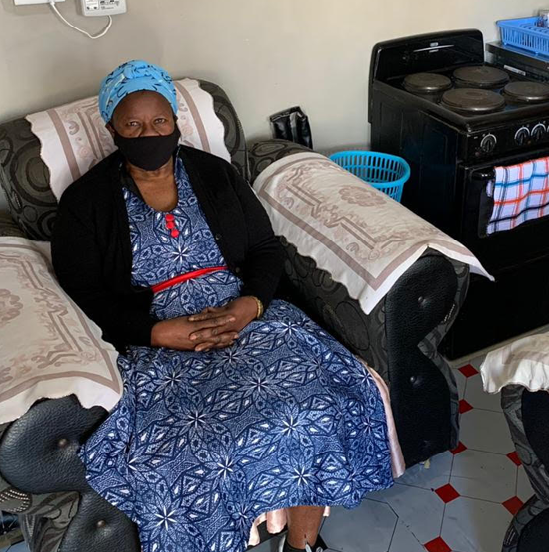
She is one of 126 beneficiaries who were moved from informal settlements to the Forest Village development in Eersteriver. The move became necessary because the cramped conditions at most informal settlements prevent people from social distancing, which is needed to help curb the spread of the Coronavirus disease (COVID-19).
“The past 27 years were not nice for me and my family. There was always dirty water running past my doorstep. I lived there with my daughter and her two children, aged 10 and four. My other daughter passed away while I was still at Kanana. The environment was bad for our health and it was not safe for the four of us,” she says.
Shack fires were a constant threat at Kanana and Patso says she never slept well because she feared her four-roomed home would go up in flames.
She says life became more stressful when COVID-19 hit the province. It was almost impossible to practice good hygiene and maintain social distancing because Kanana was so densely populated and unhygienic.
“There was no way that we could wash our hands regularly because we did not even have water taps. I feared for my life and for my children’s lives,” she says.
Patso used to work as a domestic worker but has retired due to age. Her daughter is unemployed.
She says life is much better in Forest Village, where they have a two-bedroom house with a kitchen, lounge, toilet and shower.
“It still feels like a dream. I still cannot believe that I have a nice house after so many years of struggling,” she says.
Western Cape Human Settlements MEC Tertius Simmers says being able to transform lives brings him immense joy.
“We have made a commitment to assist the most vulnerable from this community and this is exactly what we are doing. The elderly and those living with a medically certified disability are top priority. Our aim is to improve the lives of our people, while also restoring their dignity,” he says.
The MEC has called on beneficiaries to take care of their homes and to not sell them but rather draw up wills and leave them to their children.
Help make South Africa’s roads safer
Help make South Africa’s roads safer UrsulaWith the festive season known for its many road accidents, Johannesburg Metro Police Department (JMPD) spokesperson Wayne Minnaar says the first step to staying safe is ensuring your vehicle is roadworthy.
A roadworthy vehicle has a valid licence disc; a tyre thread of at least one millimetre; working headlights, taillights and brakelights; and effective windscreen wipers.
He warns that drivers who are setting off on long-distance trips must not do so at night after a full day at work because driver fatigue is the cause of many accidents.
“A driver must be well rested before embarking on a long journey and must stop and relax every two hours,” he says.
Another major cause of accidents is drinking and driving. This results in many horrific and even fatal accidents, he says.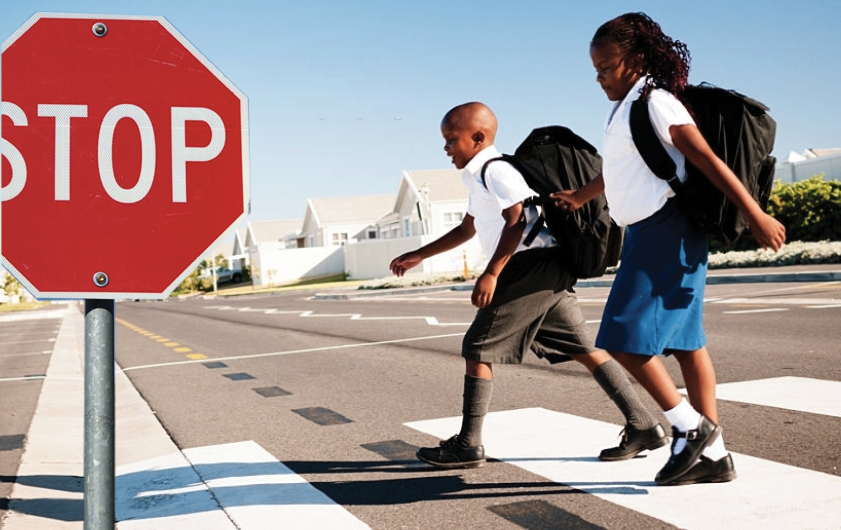
In August, Transport Minister Fikile Mbalula announced that the Road Traffic Amendment Bill was introduced in Parliament in June, with the legislation introducing a percent alcohol limit for all motorists. The new law could be in effect in December, he said, and means that a person may not drive if they have any alcohol at all in their system.
In addition to fatigue and alcohol, Minnaar says speed is another major contributing factor to road accidents. “People must drive within the speed limit,” he says, adding that there will be more traffic patrols and roadblocks as the holiday season approaches.
Starting in October, which is recognised as Transport Month, the JMPD will start holding more road safety operations.
Minnaar says the focus will be on public transport to ensure that the sector, which is the largest transporter of the public, is compliant with the rules of the road. During Transport Month, the JMPD will look at things like the validity of professional driving permits (PDP) and the roadworthiness of buses and taxis.
School transport
Parents of pupils who use student transport must ensure that the vehicles used are safe, says Minnaar, by checking that:
- There is no overloading.
- The driver is known for being a reasonable and sober-minded person.
- The driver has all the necessary driving documents, a driver’s licence and PDP.
- The vehicle used to transport pupils has a valid licence disc.
- The doors, windows and seats are in a good condition.
Occupational therapy vital in recovery
Occupational therapy vital in recovery UrsulaThe Red Cross War Memorial Children’s Hospital’s (RCWMCH) occupational therapy (OT) team has developed the Four Thoughts for Change to assist its patients’ parents and caregivers. 
OT helps people with health challenges to better participate in daily life and plays a vital role in the treatment and recovery of various medical conditions and severe trauma, such as burns or car accidents.
By using self-care, work, education, play, leisure and social activities, OT helps children to function independently. It also enhances development, promotes health and wellbeing and prevents disability.
The RCWMCH’s occupational therapists use meaningful activities to improve children’s performance in daily activities, such as dressing and school participation.
“The primary role of a caregiver in the child’s development is to promote an environment where the child can grow up and develop their full potential; have fun; be safe and healthy; and have a space where they are listened to, can express their thoughts and feelings, ask questions and receive honest answers.
“It’s a child’s job to play. Children learn through play and it contributes to their physical, intellectual and emotional development. It teaches them resilience and gives them confidence,” says Mereille Pursad, the RCWMCH’s Head of OT.
Four Thoughts for Change
The four thoughts for change are quality time, keep it positive, structure it and keep calm and manage your stress.
Quality time: Children need quality time and caregivers are encouraged to play with their children. This provides the child with security, allows for connection and builds a bridge for lasting relationships.
Keep it positive: Children could express stress by defiant behaviour, such as tantrums, irritability and withdrawal or clinging to caregivers. “A positive environment for understanding and adaptation can be created by listening to your child, using positive words when telling them what to do and praising them for what they do well.”
Structure it: Routines are vital to establish a sense of predictability, stability and security. The more a child can anticipate what is ahead, the better prepared they are to face daily challenges and expectations.
Keep calm and manage your own stress: “We strive to look at each of our patients and their caregivers holistically and maximise their quality of life. We acknowledge that it is a stressful time, however, you cannot pour from an empty cup,” says RCWMCH Occupational Therapist Dani Ferraris, explaining that breathing exercises, hobbies, meditation, prayer and exercise have proven to reduce stress.
Pedal power for community safety in Overstrand
Pedal power for community safety in Overstrand UrsulaCommunity safety in the Overstrand Local Municipality in Hermanus has received a boost after neighbourhood watch programmes, municipal units and local police stations received bicycles from the Western Cape Department of Transport.
The black and yellow bicycles were handed over as part of the Provincial Sustainable Transport Programme, which seeks to improve the mobility of community members, mainly those living in disadvantaged areas.
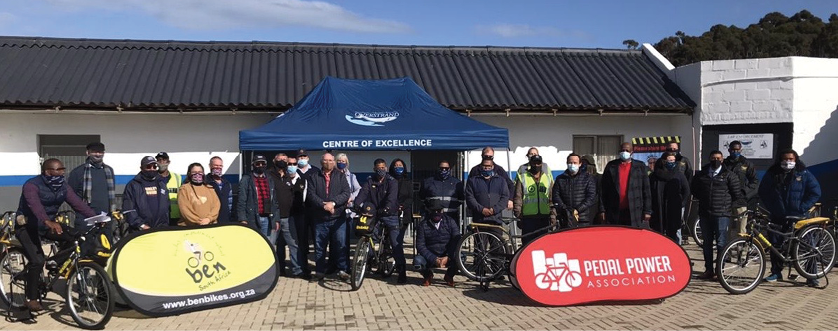 Neighbourhood watches in Onrus, Pearly Beach, Franskraal and Zwelihle each received 10 bicycles. “We live in the township and do not have access to vehicles, so these bicycles will really help us to patrol the areas better,” says Vusumzi Tshona, a member of the Zwelihle Neighbourhood Watch.
Neighbourhood watches in Onrus, Pearly Beach, Franskraal and Zwelihle each received 10 bicycles. “We live in the township and do not have access to vehicles, so these bicycles will really help us to patrol the areas better,” says Vusumzi Tshona, a member of the Zwelihle Neighbourhood Watch.
The police stations of Gansbaai, Stanford, Hermanus and Kleinmond received four bicycles each, while the municipality’s law enforcement, traffic, fire and environmental departments received 15 bicycles each.
The recipients also received a bicycle helmet, a lock, pump, tyre puncture repair kit and bicycle spanner, which will help them maintain their bicycles.
The bicycle distribution part of the Provincial Sustainable Transport Programme is being carried out with the help of partners such as the Bicycling Empowerment Network, the Pedal Power Association and Qhubeka.
The programme has reached a number of communities around the Western Cape, including informal settlements around Cape Town. Between 50 and 72 percent of people in the Western Cape rely on lifts or public transport, meaning that improving access to transport is a top priority.
Tim Mosdell, CEO of the Bicycling Empowerment Network, says that bicycles can create significant opportunities for people, ranging from school children to people looking for work.
“It’s not about simply delivering bicycles to people – it takes into account the full picture of creating a bicycle culture, helping people improve their access to education and employment opportunities, and moving people forward using bicycles as a tool for success.”
Mosdell says that school children in Overstrand will also receive bicycles as part of this same initiative.
*If you live in the Western Cape and want more information about the programme, contact the Western Cape Department of Transport at 0860 212 414.
Protect your identity
Protect your identity LondekileBe aware of people trying to steal your identity, especially on social media.
Identity theft happens when someone pretends to be you. They steal and use your personal information, such as your name, phone number, email address, date of birth, physical address, banking details and even your identity number.
When other people track this information on the internet or on social media, they think that they are dealing with you. They don’t know that someone else is using your information.
Every device and the technology you use, even though it makes your life easier, can put your information at risk.
Identity theft is one of the fastest growing crimes in the world. Experts believe that someone's identity is stolen every two seconds. Sadly, most people believe it can’t happen to them until it is too late.
According to credit bureau TransUnion, because identity theft is a silent crime, it can go for months, or even years, before the victim finds out about it. By this time, the victim has a lot of debt that has been run up in their name. They only find out when they get accounts that they know nothing about or when their application for credit is not approved.
Because identity thieves are getting smarter and faster, you have to act fast and stay ahead of them.
Protect your personal information
Some tips to protect your personal informational include:
- Don’t carry unnecessary personal information in your wallet or purse.
- Don’t disclose passwords and pin numbers by telephone, fax or email.
- Don’t write down passwords and pin numbers.
- Don’t use birth dates and first names as passwords or pin numbers.
- Don’t use internet cafés or unsecure connections to do your banking.
- Use strong passwords and change them regularly.
- Keep personal and financial documents locked away.
- When destroying personal information, either shred or burn it. Do not tear it up and put it in the garbage.
- Secure your smartphone with the lock screen security function.
- Be careful when downloading apps.
If your identity document is used to commit fraud or if it is lost or stolen, contact the SA Fraud Prevention Service at 0860 101 248 or www.safps.org.za. If your driver's license is stolen, report it to your closest South Africa Police Service as soon as possible.
Information supplied by the Department of Communication and Digital Technologies.
SA media is a key pillar of our democracy
SA media is a key pillar of our democracy SiboneloIn many countries around the world, the coronavirus pandemic has required the limitation of many civil liberties and put social cohesion to the test.
But countries with strong institutions, vigilant judicial systems and a robust media have been able to prevent human rights from being undermined and the authority of the state being abused.
It has been six months since the national state of disaster was proclaimed. Despite the unprecedented nature of the disease and the immense challenge of placing a country of 58 million people under lockdown, we have fared well. We have managed to contain the spread of the disease primarily because of the cooperation and vigilance of all citizens.
This is in no small part due to the sterling work of our media.
We owe a debt of gratitude to South Africa’s hardworking and tenacious journalists. They have kept our people informed by disseminating key health messages about social distancing and hygiene. They have done so under extremely trying conditions, often with limited resources.
They have told the stories of the effects of lockdown on the lives of people and their businesses. They have been out in the villages, towns and cities, bringing stories of ordinary people and drawing national attention to problems being experienced in hospitals and clinics, prompting government action.
Our media have also shone a light on excesses that perhaps would not have ordinarily come to light. They have fulfilled their watchdog role by unearthing acts of corruption and maladministration, sparking a massive national debate and leading to a number of high-profile investigations. Through this reporting they have earned people’s trust.
A free press is not an end in itself. It is a means by which democracy is secured and upheld. During this pandemic, our media has played not just its traditional watchdog role, but exercised its civic duty in supporting the national effort to contain the coronavirus.
Given the importance of the media to the health of our democracy, it is a great concern that like all other sectors of the economy, the coronavirus crisis has hit our media houses hard. Some publications lost as much as 60 percent of their income in the early days of the lockdown. A number of companies have had to implement salary cuts, reduce staff numbers or reduce hours worked. Regrettably, some publications have even been forced to close, among them some of South Africa’s most established and well-known magazine titles.
The job losses that have resulted from the lockdowns have exacerbated a crisis for media companies already facing challenges like loss of advertising revenues, falling circulation and market share being taken by mobile-first news and other technologies. These financial difficulties are being faced across the board, from online titles to traditional broadsheets to the public broadcaster.
This was one of the issues that was raised sharply during my engagement with the South African National Editors’ Forum recently. Instead of lamenting their fate, however, the media industry is working hard to refine business models, to drive innovation and to retain staff as much as possible.
At the same time, the media is a unique entity in any society because its practitioners fulfil a role that is so essential to our democratic order. They work to keep the public informed and to keep power in check.
We need more journalists, not less. That is why the loss of even a single journalist is not just a loss to the industry but to the country.
We need our media veterans, who bring with them vast experience and institutional memory, and are able to offer critical reportage and informed analysis. At the same time we need more young journalists in the profession who are tech-savvy, abreast with new trends in storytelling and in touch with the concerns of a youthful population.
As a society we owe the media our full support. Whether it is electing to pay for content, supporting crowdfunded journalism, paying our SABC license fees or simply buying a newspaper, we can all play our part to support this industry in crisis. As government, despite the gloomy economic climate we will continue to extend advertising spend to publications and broadcasters, especially community media.
The private sector must also continue to support the industry through advertising and working with media houses in the production of innovative content in line with global media trends. Local philanthropic and donor organisations should also come on board and support public interest journalism ventures, as is the case in many democracies.
The proliferation of fake news during the pandemic, primarily on social media platforms, has added to the urgency for more news that is accurate, fair and impartial. During this time our people have relied on our established media houses for information, once again underscoring their importance as pillars of our democracy.
As we begin the great task of rebuilding our economy in the aftermath of the pandemic, the media industry will need our support more than ever. The free press was once described as ‘the unsleeping guardian of every other right that free men and women prize’. As we salute their role in this pandemic, let us do what we can to ensure that the free and diverse media in our country is able to survive and thrive.
SA moves to Alert Level 1
SA moves to Alert Level 1 LondekileSouth Africans are celebrating the country’s move to Coronavirus (COVID-19) Alert Level 1, which came into effect at midnight on 20 September.
President Cyril Ramaphosa recently announced the good news to the nation, explaining that the number of positive COVID-19 cases has dropped from an average of 12 000 cases a day, two months ago, to less than 2 000 new cases a day.
Since the national state of disaster was declared six months ago, over 15 000 South Africans have lost their lives and over 650 000 have been infected with the virus.
“We now have a recovery rate of 89 percent… There has been a gradual, but steady, decline in new infections, hospitalisations and deaths. Demand for hospital beds, ventilators, oxygen and other essential medical requirements has also reduced steadily.
“We have succeeded in overcoming the worst phase of this epidemic, while protecting the capacity of our health system,” the President confirmed.
He applauded South Africans for this achievement and for the thousands of lives that have been saved through their collective actions. “This achievement has also been recognised by the World Health Organisation,” he said.
A deadly epidemic
While the country has made great progress, people are still getting infected with the virus and some are losing their lives. 
“By any measure, we are still in the midst of a deadly epidemic. Our greatest challenge now – and our most important task – is to ensure that we do not experience a new surge in infections,” the President said.
He explained that several countries around the world, that had passed the peak of the virus and thought they had brought it under control, have been hit by a ‘second wave’ of infections. “In many cases, the second wave was more severe than the first. Several countries have had to re-impose a hard lockdown.”
As such, South Africa’s public health response is focused on further reducing the transmission of the virus and preparing for another possible surge.
Increased testing
Government will keep increasing COVID-19 testing. “Due to the decline in new infections and the reduced pressure on our health facilities, we now have sufficient testing capacity to expand the criteria for testing,” the President explained.
People who can now test for the virus are those admitted to hospital; outpatients with symptoms; and those who have been in close contact with confirmed cases, whether or not they have symptoms.
Government is also improving contact tracing with the COVID Alert South Africa mobile phone app and the COVID Connect WhatsApp platform. “I want to make a call to everyone who has a smartphone to download the COVID Alert mobile app from the Apple iStore or Google Play Store,” President said. The app is free to download and use.
A nationwide survey is also being undertaken to assess levels of virus infection. It will use antibody tests to see if someone has been exposed to the virus. “A nationwide study will allow scientists to estimate the extent of asymptomatic infections and immunity within the population and better understand the transmission patterns of the virus,” the President said.
Government is also participating in a global initiative to pool resources for the development and distribution of a vaccine. “We are also investing in our own capacity to produce and distribute a vaccine locally… Our country is already participating in three vaccine trials, demonstrating the capability of our scientific community.”
Rebuilding the economy
The President said that because there are still certain restrictions in place, the national state of disaster has been extended to 15 October.
“The move to Alert Level 1 removes many of the remaining restrictions on economic activity, although it may be some time before it is safe for all sectors to return to full operation.
“Global and domestic demand and supply of goods and services for some sectors will remain low for the foreseeable future, regardless of the lifting of restrictions. It is therefore vital that we move with urgency to rebuild our economy, restore growth and create jobs.
“As we settle into a new normal and learn to live alongside the virus, we must continue to exercise every possible precaution to avoid infecting others,” the President said.
Sanitary towels bring dignity to young women
Sanitary towels bring dignity to young women UrsulaA sanitary towel donation drive has enabled girls in three provinces who would previously have missed school when menstruating, to continue with their education. 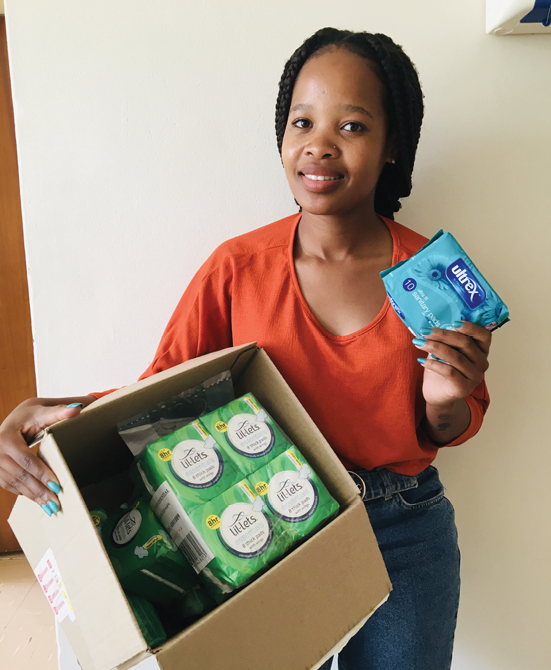
Sanitary towels have been donated by Petunia Shongoane (27), the project manager at the National Library of South Africa, to schools in Kimberley in the Northern Cape, Zebediela in Limpopo and Pretoria in Gauteng.
Shongoane says the donation of the sanitary towels to schools is bringing dignity to young girls.
“A lot of young girls drop out of school because they are made to suffer the indignity of being teased by their peers when they go through their menstrual cycle,” she says.
In addition, their schoolwork suffers because if they cannot afford sanitary products, they have to miss school when they are menstruating.
Following the call by President Cyril Ramaphosa for ordinary South Africans and private companies to adopt a school in need, Shongoane says she chose to become involved with two rural schools – in Mokopane, Limpopo – because the majority of girls in rural areas do not have access to sanitary towels.
Shongoane says that girls without access to sanitary products can miss up to 11 weeks of school a year and this often means they do not perform as well as other children.
Government supplies free sanitary pads
The programme to supply young girls with sanitary towels saw government supplying more than 115 million pupils with sanitary towels in the 2019/20 financial year.
According to Acting Chief Director for Social Empowerment at the Department of Women, Youth and Persons with Disabilities Sipiwo Matshoba, the pads ensured that no girl child missed or dropped out of school because they were menstruating.
He says they are working with various provincial government departments to eventually provide free sanitary towels to all girls at no-fee schools.
“As part of the Sanitary Dignity Framework, we are forming partnerships with non-governmental organisations and private companies to increase the number of sanitary towels that are donated to schools, especially the no-fee schools,” says Matshoba.
Matshoba says those looking to donate sanitary towels should contact their provincial department of education or social development to find out which schools are not already covered by the state.
Those looking to donate to Shongoane’s sanitary towel drive can contact her on Twitter using the handle @Petunia_SS or send her an email: petunia.ss@yahoo.com.
Technology helps save the school year
Technology helps save the school year SiboneloHaving multimedia centres in schools is beneficial to teachers and learners who need to save the school year and play catch-up with the syllabus, as the education sector was negatively affected by the novel Coronavirus (COVID-19). 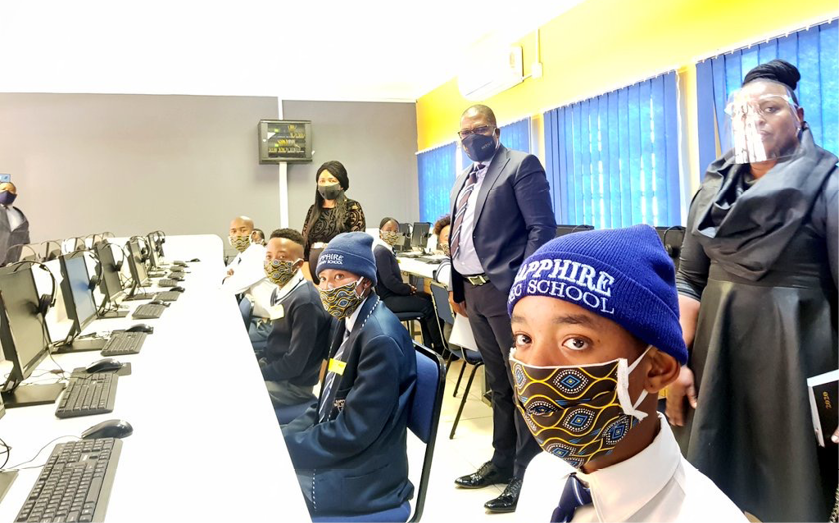
This is according to Sapphire Secondary School Deputy Principal Salamina Nchaupe.
Her school, as well as Rutasetjhaba Secondary School, both in Sedibeng in the Vaal area, received multimedia centres and tablets from the Gauteng Department of Education in partnership with MTN SA Foundation and Huawei South Africa.
Nchaupe says the national lockdown, introduced to combat the spread of the infectious disease, interrupted their school calendar. As a result, learners and teachers had to first adapt to home schooling and then to the irregular school times that were implemented to maintain social distancing when learners returned to class.
“Over and above using the smart board in the multimedia centre and digital devices that were handed over to learners for every day teaching and learning in class, I believe this centre and educational gadgets will also come in handy in helping learners continue doing their research and learning at home because there is a lot of catching up that we need to do,” she says.
“Grade 12 learners are also using the centre to look at their various options and the opportunities available to them when they complete their matric. They can also use the centre to apply for a National Student Financial Aid Scheme bursary,” she says.
Nchaupe says the more than 100 tablets given to her school will go a long way in improving how education is delivered to the 1 200 learners.
She asked community members to help keep the school safe and to report any suspicious behaviour.
“We hope that no burglaries will be experienced by our school as we have seen it happening to other schools that had received similar equipment in the province in the past. We have various security measures in place to ensure that we safeguard this investment, for the benefit of our learners, but it is also the community’s responsibility to make our schools safe,” she says.
Tshepong Hospital succeeds in healing XDR TB patients
Tshepong Hospital succeeds in healing XDR TB patients UrsulaTshepong Hospital in Klerksdorp in the North West has closed its Extreme Drug Resistant Tuberculosis (XDR TB) unit because patients have fully recovered and no new cases have been recorded. 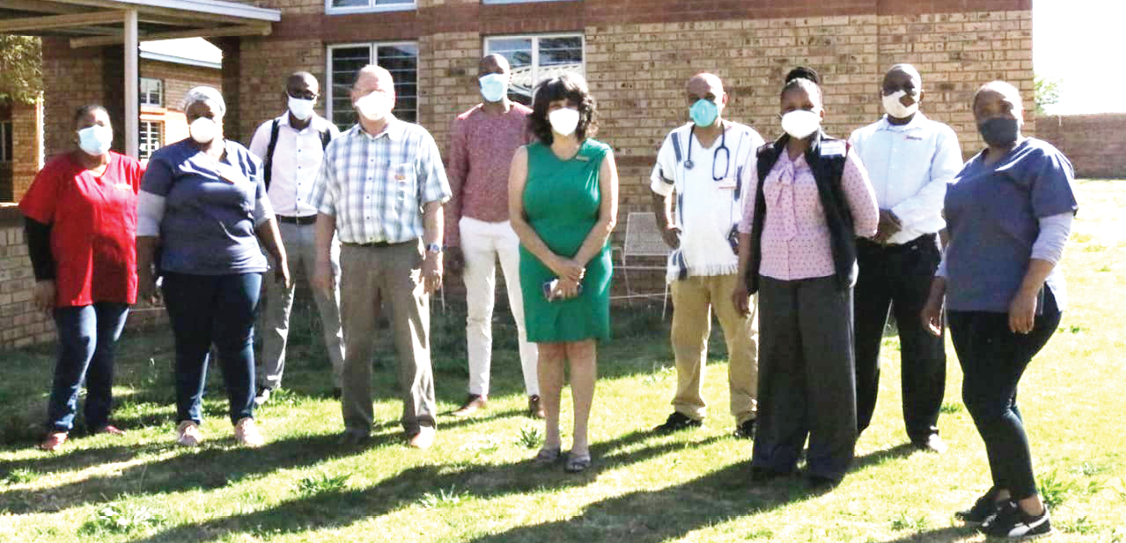
The medical officer who works in the unit and has extensive training in drug resistant TB, Dr Hannetjie Ferreira, says this is good news for residents as the patients who struggled with the disease for many years have been completely cured and there are no new cases. The chances of anyone in Klerksdorp getting infected are greatly reduced.
Dr Ferreira says the ability to successfully treat TB and XDR TB was made possible the introduction of new TB treatment which was in line with the National Tuberculosis Programme (NTP).
According to Dr Ferreira, the 22-bed unit was built 10 years ago by the Council for Scientific and Industrial Research. It was dedicated to patients who struggled to take care of themselves at their own homes, including those who were defaulting on their medication.
The unit was the first in South Africa to initiate a patient on the new medicine regimen under the Bedaquiline Clinical Access Research Programme in March 2013. This led to a cure rate of 81 percent for XDR TB within the first two years and a decline in community transmission.
At its busiest, the unit had six doctors but in recent years, the number was reduced to three because of the decreasing patient numbers. The unit used to diagnose about 10 new cases of XDR TB per year and between 30 and 40 pre-XDR cases annually in the province. With the success of the new treatment, this figure started dropping and only two patients with XDR TB were diagnosed in 2019. So far this year, no case has been reported.
“Because there are no patients in the unit, we were able to redirect resources to other healthcare needs of the hospital and the province, such as catering for patients who have tested positive for the Coronavirus and are in need of hospital facilities,” she adds.
Vangasali campaign strengthens the ECD sector
Vangasali campaign strengthens the ECD sector SiboneloA campaign by the Nelson Mandela Foundation and the Department of Social Development (DSD) is helping early childhood development (ECD) centres to get registered and provide effective care to children around South Africa. 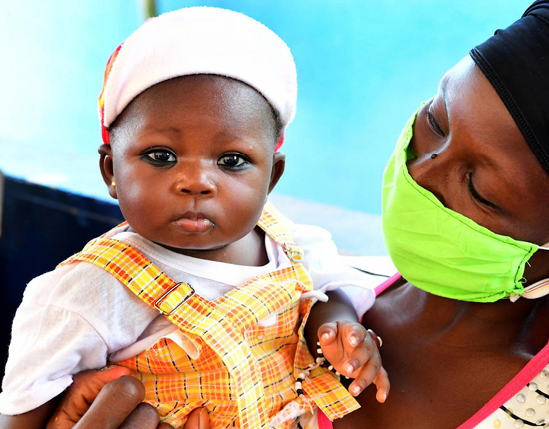
Phase 1 of the Vangasali (meaning ‘No One Left Behind’ in Xitsonga) campaign was launched in June, and aimed to find every ECD centre in South Africa. During this phase, more than 52 000 ECD services were identified around the country.
Sumaya Hendricks, dialogue analyst at the Nelson Mandela Foundation, explains that it is important for the DSD to build a database of ECD providers in South Africa.
“While the DSD has some data regarding the scale of ECD provisioning in the country, this covers mostly registered and conditionally registered sites. There are, however, thousands of unregistered ECD services and non-centre based ECD services, including mobile services, that government does not have data on because they are unaware of where these centres operate from.”
Phase 2 of the campaign is now underway. It aims to support ECD centres in applying for registration with the DSD. Hendricks says that registered centres are better able to access government relief measures and support, which is especially important during the Coronavirus (COVID-19) pandemic, which has meant that many ECD centres have been closed.
Hendricks says the COVID-19 crisis hit unregistered centres hard because they were unable to benefit from government’s relief measures.
Abram Kgari, the chairperson of the Diepsloot ECD Forum in Gauteng, says that getting centres registered can also give them access to subsidies that can help pay for the running of the centres.
He encourages parents to find centres that are registered with the DSD because the subsidies they receive help them to provide a better level of care.
How do you register an ECD centre?
ECD service providers can register an ECD centre by contacting their nearest DSD office. They should also contact their local municipality and the departments of Education and Health to get the right permissions and the necessary health clearance certificate.
The importance of effective ECD
- Helps create a positive environment for young children.
- Lays the foundations for a good start at school because the first five years of a child’s life are the most important for developing important basic functions such as motor skills, counting, creativity and social skills.
Waterless car wash gives entrepreneur a sparkling future
Waterless car wash gives entrepreneur a sparkling future UrsulaNqobile Rathebe (23) of Protea Glen in Soweto, Johannesburg, is running a waterless car wash because she wants to save water while earning an income and satisfying her clients’ needs. 
She is the owner of Nqotrends (Pty) a mobile car wash that uses chemicals to wash cars instead of water.
Rathebe’s business sets her apart from her competitors because she is focused on trying to help South Africa save water.
She says water is only used to rinse the cloths, adding that the chemicals they use to clean and polish the cars cause no damage to the paintwork and leave their clients totally satisfied with their work.
Rathebe registered her business in 2018 and started operating at the beginning of 2019. Initially, she was using buckets of water to wash cars like most car washers because she did not have the equipment to run a waterless car wash. However, this changed when she received a R41 978 business grant from the National Youth Development Agency (NYDA).
“My dream of running a waterless car wash came true within two years of operation,” she says. “It takes me 15 minutes to wash a car and I go to my clients instead of expecting them to drive to me,” she says.
Rathebe has always had a business mind. When she was a financial management student at Westcol Technical and Vocational Education and Training College, she used to wash rubbish bins for her neighbours to earn an income.
“After graduating, I could not find a job so I decided to register a business and create employment for myself,” she says.
She approached schools in her area and started washing the cars of staff members once a week and slowly she built up her business.
Unfortunately, Nqotrends was negatively affected by the national lockdown and Rathebe had to let some employees go. However, she hopes to re-hire as the business regains momentum.
For more information about the NYDA, call 0800 52 52 52 or email info@nyda.gov.za
Waving goodbye to ocean plastic pollution
Waving goodbye to ocean plastic pollution LondekileSouth Africa is on a drive to prevent litter from destroying our river and ocean environments, while also creating jobs in the process.
Every year, up to 250 000 tonnes of rubbish enters the oceans around South Africa, mainly by being carried down to the sea in rivers. This rubbish cannot only harm birds, mammals and fish, but can also damage ship propellers and drive away tourists.
Various initiatives are now underway to stop this flow of rubbish, mainly through the use of litterbooms, which are large plastic pipes that are stretched across the surface of rivers, catching harmful plastics before they can get to the sea.
An organisation called The Litterboom Project (TLP) has worked hand-in-hand with the City of Cape Town and municipalities in KwaZulu-Natal since 2017, setting up seven litterbooms in some of the major rivers that flow into the ocean. 
TLP founder Cameron Service explains that an important part of the project is to empower local community members and give them opportunities to earn an income.
“At the core of the project is empowering local teams, who have to live with the waste, to both clean up the rivers in their area, as well as to provide opportunities to work and provide for their families,” he says.
Litterbooms are situated in places where they can collect the most rubbish. This rubbish is then collected for recycling by the TLP team.
In another initiative, the national Department of Environment, Forestry and Fisheries (DEFF) is joining forces with NGOs such as Coastwatch and Durban Green Corridors in KwaZulu-Natal to stop the flow of marine litter using litterbooms in five river systems.
During the two-year project, communities will help clean out the booms on a daily basis.
“Through increased litter collection and community-led waste sorting and recycling, the department will reduce litter generation at its source, thereby lessening the amount of pollution that reaches the ocean,” says DEFF project manager Yazeed Petersen.
“One possibility being considered is the idea of ‘swop-shops’ where community members can trade the recyclable litter for essentials. This will further encourage communities to become involved in litter collection,” says Petersen.
Waste collector Gumede Nkosana says that swop-shops will help him to provide for his family.
What every man should know
What every man should know LondekileProstate cancer is one of the leading cancers in men worldwide and is the number two cause of cancer deaths among men in South Africa.
The prostate gland is a small organ that is found only in men. It is located below the urinary bladder and the urethra runs through it. The normal function of the prostate gland is to make part of the semen that is released during ejaculation. 
Cancer of the prostate develops in the prostate gland and the cancer cells may eventually spread outside the gland to other parts of the body. Prostate cancer is generally slow growing and gets worse over time.
Risk factors
Although the actual cause of prostate cancer is not known, the following risk factors have been identified:
Age – Men over 50 years are at risk. More than 80 percent of all prostate cancers are diagnosed in men over the age of 65 years.
Family history – If a father or brother had prostate cancer, there is an increased risk of getting the disease.
Unhealthy diet – There is a relationship between a diet high in animal fat and protein (especially red meat) and prostate cancer.
Reducing the risk of prostate cancer
The following guidelines should be observed:
Annual screening from the age of 50 years.
If there is family history of prostate cancer, annual screening is advisable from the age of 45 years.
If you are at risk, a diet low in animal fat and protein is advisable. Health professionals often advise you to have a blood test and a rectal examination. The blood test measures the level of a protein called Prostate Specific Antigen (PSA) in the blood. If the blood test results show an increased level of PSA, you will be referred for further investigation.
Any condition affecting the prostate can cause the PSA level to rise. A rise in PSA does not mean that the person has cancer.
A rectal examination may confirm the presence of prostate cancer. This examination generally discourages men from seeking medical advice but it is vital to understand that this examination must be performed for your health and well-being.
The importance of early detection
The early detection of prostate cancer greatly improves the success of treatment. Remember, it is your responsibility to look after your own health and to seek advice from a health professional, especially if you have ongoing pain.
Should you have any concerns about your health, please talk to a health professional at your nearest clinic.
This information was supplied by the KwaZulu-Natal Department of Health.
Wills help avoid family feuds
Wills help avoid family feuds LondekileBy drawing up a will, you get to decide who gets your belongings and cash after your death.
Awill is a legal document that describes what should happen to a person’s belongings and money when they die.
“A will ensures that your belongings are divided among your chosen beneficiaries. When you have a will, you avoid family conflicts that might arise after death,” says Advocate Refilwe Morake from the Master of the High Court.
He warns that should you pass away without having drafted a will, your estate (all your money and property) will be intestate, meaning your assets might not go to your chosen beneficiaries. Instead, they will be divided among your surviving spouse, children, parents or siblings, according to a set formula.
A will should list all your assets – such as houses, furniture and cars, and your liabilities, which is your debt. It should give the name of an executor, who will gather up all your assets and ensure they are distributed according to your will.
“Anyone who is above the age of 16 may make a will, unless they are incapable of appreciating the consequences of their actions,” explains Morake.
He says a will can be drawn up at a lawyer’s offices, a bank or a trust company and may be kept with them for a fee, or at home.
The last will to be drawn up is the one that is considered to be valid. Morake warns that should you update your will, the latest version must state that all previous wills are cancelled.
He adds that it is important to update your will as soon as there are import changes in your life, such as a marriage or divorce.
“Once there is a divorce decree, you must change your will within three months. If you die three months after the divorce without changing your will, then the court will assume that you were happy with your last will and divide your assets according to that will,” he says.
To learn more about drawing up a will, contact the Department of Justice at 012 315 1111/ 1004/ 1002. Alternatively, visit any Master of the High Court office.
Young entrepreneur opens online mall
Young entrepreneur opens online mall UrsulaWith the digital world changing how business is done, a young entrepreneur says it is time to look at how South African youth can use technology to grow the economy. 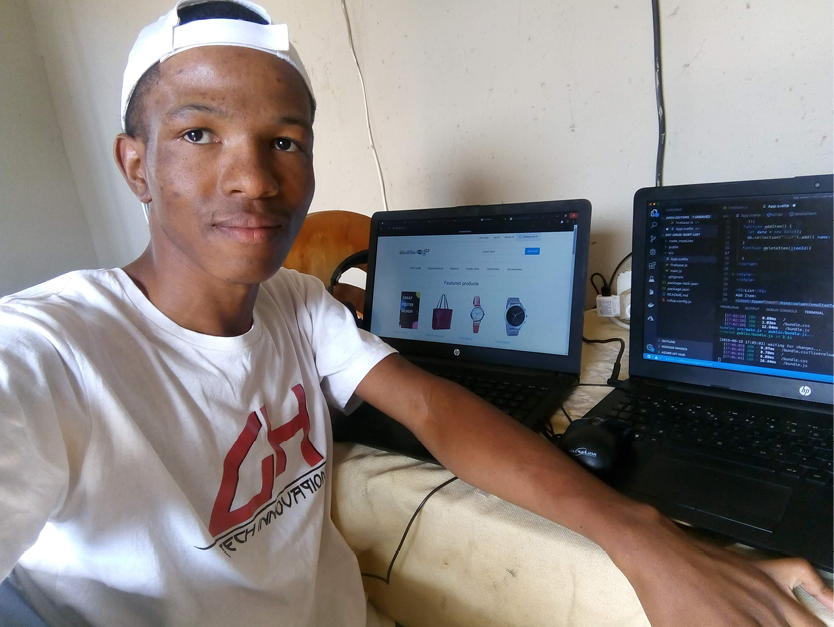
Diketso Setho (25) is the owner of GH Mall, an online mall that gives township businesses the opportunity to sell their products online. It mainly targets small businesses that sell clothing, accessories, local art, merchandise and books.
A resident of in Mayibuye, a township between Midrand and Tembisa in Ekurhuleni, Setho could not afford to study further after matric. Instead, he taught himself how to do computer programming and completed short courses online to increase his information technology knowledge.
“Because of technology, one robot can replace 90 percent of employees in various industries and a robot does not need a salary increase but just a software update in order to keep operating. That means if people do not get the necessary skills, more people will lose their jobs. You have to ask yourself how you are going to contribute to the economy using technology and make sure you are not left behind,” he says.
Setho says he started GH Mall after realising that many small businesses that sell their own brands, especially start-ups, could not afford to hire a skilled technologist to develop e-commerce, security and automation, among others.
One of the challenges facing the business is that many consumers are still uncomfortable with buying things online.
“We need to adapt to the world of technology since it makes our lives easier. People are still scared of online shopping, even though it is the future,” he says.
Setho is proud that his business has created a platform for local small businesses to grow their client base and that he has already created three jobs at GH Mall, which was only launched two weeks before the national lockdown was implemented.
Businesspeople who want to sell products through this online portal can visit www.ghmall.co.za to apply. Alternatively, call 084 308 8893.
Zamokuhle assists gogos in need
Zamokuhle assists gogos in need UrsulaSinging, laughter and the clinking of teacups are often heard at the Thembalami Care Centre when the Zamokuhle Gogos get together. 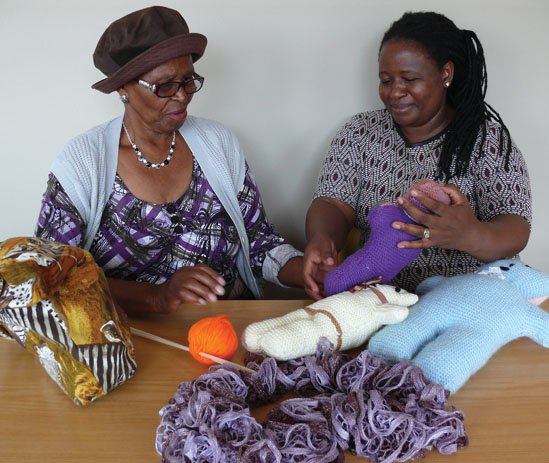
Thembalami Care Centre has been bringing warmth and happiness to the lives of Alexandra and River Park elders for over a decade, through its Zamokuhle outreach programme.
Situated in Lombardy East outside of Johannesburg, Thembalami launched the Zamokuhle outreach programme in 2009.
Zamokuhle, meaning
‘ Strive for the good’ in Zulu/Xhosa, was funded in full by Rand Aid, itself a non-profit organisation, for five years. Government funding was then sourced to help subsidise the initiative, which has enabled Thembalami to expand the programme and invite additional elders to benefit.
“Three days a week, elders – now fondly known as the Zamokuhle Gogos – come to the care centre to learn a variety of handcrafts, like knitting and crocheting. They also enjoy breakfast, morning tea and lunch and benefit from health and social awareness initiatives,” says Ayanda Matthews, GM Compliance and Social React Division at Rand Aid.
The programme also empowers participants about elders’ rights, via a monthly abuse awareness programme; assists with problems the participant may be experiencing; and provides education about ageing and chronic diseases faced by the elderly, such as dementia, Alzheimer’s and Parkinson’s disease.
“The purpose of the programme is to keep the gogos in the community for as long as possible and to keep them independent and active,” says Matthews.
“The gogos in turn give back to the community, by knitting teddies for children and tackling other community projects,” she adds.
Thembalami, which has 114 beds of which 75 are partially subsidised by government, looks after people who are either physically or mentally frail, or both, and who are in dire need of 24-hour frail care.
For more information about Thembalami and the Zamokuhle outreach programme, contact the care centre at 010 534 8771.